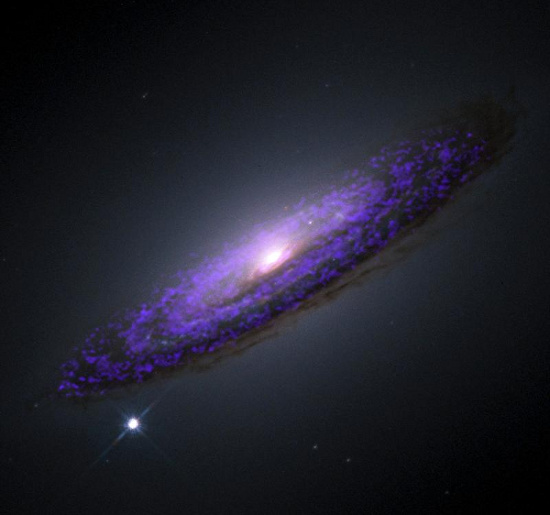New way of 'weighing' black holes
Researchers have proposed a new way to determine the enormous size of black superholes.
>>>New conjecture about the shape of a black hole
Black holes are known to exist at the center of most galaxies, but there are still many unanswered mysteries that are their influence on galaxies' evolution.

Black hole in central galaxy NGC4526 has been re-estimated volume - (Photo: NASA)
The new approach, published in Nature, deduces the mass of a black hole based on the molecular speed around it.
This helps to weigh hundreds of black holes near the Milky Way, and the first application shows the black hole in NGC4526 galaxy weighing about 450 million times our sun.
Experts now only estimate the mass of several dozen black holes. Because they cannot be seen directly, astronomers must rely on the motion of objects around them.
Most of the predictions are based on light gathering, by calculating the movement of stars near black holes compared to more distant stars, but this calculation method has average accuracy, and has can be disturbed by random movements of some unusual stars.
The new study focuses on cool, dense, less turbulent air masses, and emits radiation at ultrasonic wavelengths in the electromagnetic spectrum. This allows the use of telescopes with better resolution, according to expert Timothy Davis of the Southern European Observatory.
New estimates are expected to help reveal the interaction between black holes and host galaxies.
- Millions of black holes are hiding in our galaxy
- Decoding mistakenly thought that the black hole of the universe is
- Discover the mystery of the most exotic black holes in the universe
- Three huge black holes are about to collide in the universe
- Why can black holes glow?
- Unexpectedly discovered 5 mysterious black holes in the universe
- The galaxy has 3 black holes
- Detected stunned the power of the supermassive black holes
- For the first time, two black holes revolved around each other
- What if a black-sized black hole attacked the Earth?
- The impact sound of two black holes: surprisingly gentle and melodious
- The supermassive black hole is 20 billion times more massive than the Sun
 Van Allen's belt and evidence that the Apollo 11 mission to the Moon was myth
Van Allen's belt and evidence that the Apollo 11 mission to the Moon was myth The levels of civilization in the universe (Kardashev scale)
The levels of civilization in the universe (Kardashev scale) Today Mars, the sun and the Earth are aligned
Today Mars, the sun and the Earth are aligned The Amazon owner announced a secret plan to build a space base for thousands of people
The Amazon owner announced a secret plan to build a space base for thousands of people Black holes create mysterious swirling 'structures' that could open 'gateways' into dark matter
Black holes create mysterious swirling 'structures' that could open 'gateways' into dark matter  Surprising facts about the black panther - the inspiration for the character Black Panther
Surprising facts about the black panther - the inspiration for the character Black Panther  The nearest black hole discovered is only 150 light years from Earth
The nearest black hole discovered is only 150 light years from Earth  New discovery of the oldest black hole in the universe
New discovery of the oldest black hole in the universe  The Black Pyramid and the tragedy of deep oblivion: A thousand years later, still no escape from the tragedy of tomb raiding
The Black Pyramid and the tragedy of deep oblivion: A thousand years later, still no escape from the tragedy of tomb raiding  Exploring the 'Black Box of the Earth' project: A device that records the process of human extinction
Exploring the 'Black Box of the Earth' project: A device that records the process of human extinction 